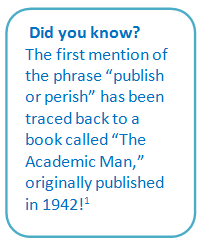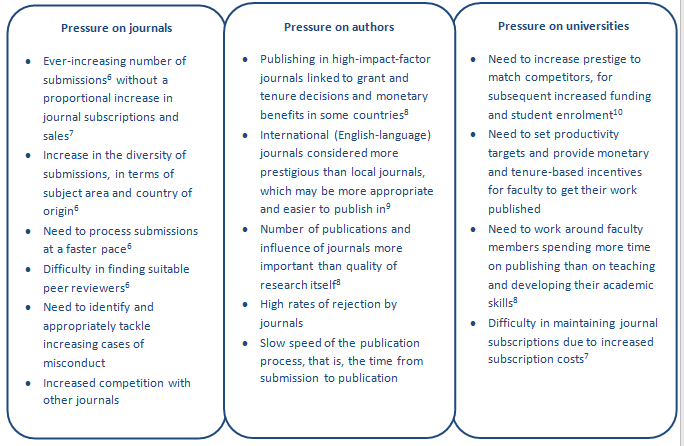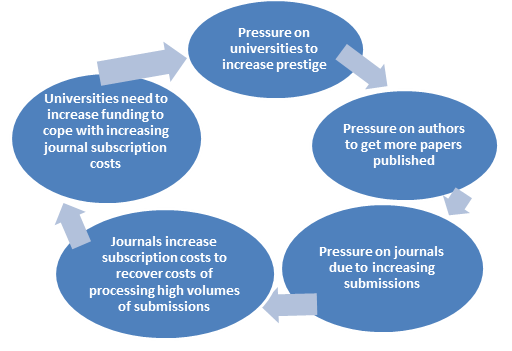Navigating through the pressure to publish

The first peer-reviewed scholarly journals— the Journal de Sçavans and Philosophical Transactions of the Royal Society (of London) were published in 1665.2 Thus began the system of journal publication as we know it today—as a quest to discover, record, and share new knowledge. The 19th century witnessed the diversification and specialization of research disciplines, leading to a surge in research output and an explosion in the number of specialized journals.3 Commercial publishers came onto the scene in the 1960s and e-publishing, that is, journals with electronic archives became popular in the 1990s.4 
- Quality control: The peer review process became a means to attest the quality of published articles.
- Author evaluation: A researcher’s publication record became an indicator of his/her “competence and effectiveness” as a scientist.
- Author recognition: Successful publication in peer-reviewed journals improved an author’s standing in the community and his/her prospects for future funding, tenure, or promotion decisions.
- Ownership and priority on discoveries: Authors could claim priority and ownership on a discovery once their findings had been published in a peer-reviewed journal.
Current pressure to publish
As the global expenditure on research initiatives continues to increase at a rapid pace, so does the number of researchers and the volume of research output. This puts new pressures on researchers, journals, and academic institutions alike, far exceeding the pressures that were prevalent in the past.
Further, the inter-dependence of these pressures leads to a vicious cycle. The pressure on universities to increase their prestige puts pressure on their researchers (authors) to get more papers published. This increases the number of submissions, putting cost pressures on journals, because of which journals increase their subscription fees. University libraries then find these journal subscriptions expensive and feel the need to increase their external funding, which can be achieved through greater university prestige. And so it goes on in a vicious cycle as exemplified by the graphic below.
Fallout of the pressure to publish
As can be expected, the pressure to publish has many grave consequences that can damage the integrity of the entire research community and the academic publishing industry. Some of these consequences have been listed below.
- Bias in journals: Journals choose to publish only studies with positive findings.8,11
- Lack of replication: Replication studies (those aimed at reproducing the results of previous studies), which are fundamental to the progress of science, are disregarded.
- Manipulation of the impact factor: Journals publish only certain types of studies that will earn them more citations and thus increase their impact factor.
- Compromise of the peer review process: Time pressures and unavailability of peer reviewers may compromise the integrity of the peer review process.12
- Honorary authorship: Multiple authors, including guest authors, undeserving of authorship, are listed as authors on papers.13
- Misconduct among authors: Authors may resort to salami slicing, plagiarism, misrepresenting their results, nondisclosure of conflicting interests, etc. , just to increase the number of publications to their name.8
- Excessive reliance on citation metrics: Universities and grant committees give undue importance to citation metrics when making decisions for grants and promotions.8
The way forward
It’s evident that the pressure to publish is putting a strain on the entire research community. But the good news is that the academic publishing industry has largely recognized this pressure and is continually innovating new strategies to navigate through it. For example, the move of many journals from print-based to electronic publication has considerably reduced the problem of space constraints in journals.
Some open access journals have adopted modified peer review processes wherein articles are assessed mainly for their scientific soundness and strength rather than their novelty. E-print servers allowing dissemination of unpublished research are also gaining acceptance.
Newer models of peer review are emerging: one example is the post-publication open peer review system pioneered by the Faculty of 1000, where articles are published online without pre-publication peer review and are subsequently reviewed by experts in an unblinded manner, with the comments of the reviewers being made publicly visible. Excessive dependence on citation metrics is being discouraged, with research underway to identify more reflective and qualitative article-level measures of research impact.
As an author, here are some small steps you can take to beat the pressure and increase your standing in the research community:
1. Plan your annual publications well: For example, you could aim to conduct research in the first half of the year and submit your manuscripts by the end of the year so that you can have those as publications on your resume by the first half of the next year.
2. Make your research more accessible: Self-archive various versions of your papers to make your work more accessible.
3. Boost your resume with items other than your publications: For example, show your participation in conferences, memberships to scholarly societies, contributions as a peer reviewer, teaching or clinical achievements, awards received, etc. Show article-level metrics and qualitative measures like comments and tweets as indicators of your research impact.
4. Connect with other researchers: Use conferences and social media forums for researchers, like ResearchGate, to network and increase your visibility.
5. Communicate your research to the public: Write articles that describe your research and its value in terms that can be understood by lay people, and disseminate them online, through your personal website or social media sites.
Conclusion
The pressure to publish is probably here to stay. But instead of letting it get the better of you, you can rise above it and achieve your research goals by keeping abreast of new innovations in the publishing industry and planning your career smartly.
Related reading:
- The complete guide to writing a brilliant research paper
- Timeless tips for authors from an experienced journal editor and academic trainer
- A step-by-step guide to creating a journal publication schedule in 2018 (Download- Journal publication planning template)
Bibliography
1. Garfield E (1996) What is the primordial reference for the phrase ‘publish or perish’? The Scientist, 10: 11.
2. Lock S (1992) Journalology: evolution of medical journals and some current problems. Journal of Internal Medicine, 232: 199–205.
3. Correia AMR and Teixeira JC (2005). Reforming scholarly publishing and knowledge communication: From the advent of the scholarly journal to the challenges of open access. Online Information Review, 29: 349–64.
4. Hahn TB, Burright M and Duggan HN. Has the revolution in scholarly communication lived up to its promise? ASIS&T Bulletin, June/July 2011. http://www.asis.org/Bulletin/Jun-11/JunJul11_Hahn_Burright_Nickisch.html
5. The Royal Society. Knowledge, Networks and Nations: Global scientific collaboration in the 21st century. 2011. ISBN: 978-0-85403-890-9
6. Thomson Reuters. Global publishing: Changes in submission trends and the impact on scholarly publishers. 2012.
7. Ferguson IB (2003). Publishing papers in international journals. Journal of Zhejiang University –Science A, 4: I-IV.
8. van Dalen HP and Henkens K (2012). Intended and unintended consequences of a publish-or-perish culture: A worldwide survey. Journal of the American Society for Information Science and Technology, 63: 1282–1293.
9. Overview of STM journal publishing. Scientific publishing in transition: an overview of current developments. 2006. http://www.stm-assoc.org/2006_09_01_Scientific_Publishing_in_Transition_White_Paper.pdf
10. Rudacille D. Journal Fever: Is the pressure to publish in high-profile journals harming science? http://www.hopkinsmedicine.org/institute_basic_biomedical_sciences/news_events/articles_and_stories/employment/200604_journal_fever.html
11. Easterbrook PJ, Berlin JA, Gopalan R, Matthews DR (1991). Publication bias in clinical research. Lancet 337: 867–872.
12. Colquhoun D. Publish-or-perish: Peer review and the corruption of science. The Guardian: http://www.guardian.co.uk/science/2011/sep/05/publish-perish-peer-review-science
13. iThenticate. Pressure to publish: How globalization and technology are increasing misconduct in scholarly research. http://cdn2.hubspot.net/hub/92785/file-5414706-pdf/media/pressure-publish-free-white-paper.pdf







